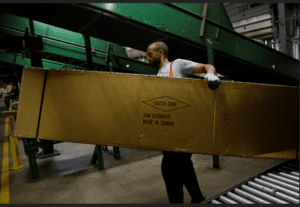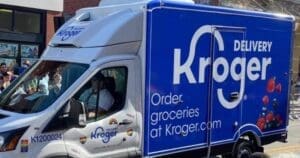 Amazon has continued to grow its logistics network over the last few years, adding more branded trucks, airplanes, and drones. But the company is not happy with just owning logistics; it continues to expand its Prime benefits. And now, Amazon has added Metro-Goldwyn-Mayer (MGM) to its portfolio. On Wednesday, Amazon announced it would acquire MGM for $8.45 billion, which is about 40 percent higher than other buyers such as Apple and Comcast thought it was worth. This could be a boon to the streaming content on Prime Video, as even though MGM sold off its vast production lot and pre-1986 film library decades ago, it still owns the James Bond franchise (at least 50 percent of it). More old-time studios have become less willing to license content to streaming services, so by acquiring MGM, it can fold everything into its Prime Video library. I wonder if Jeff Bezos will replace the MGM lion with himself and roar to open movies from now on. And now on to this week’s logistics news.
Amazon has continued to grow its logistics network over the last few years, adding more branded trucks, airplanes, and drones. But the company is not happy with just owning logistics; it continues to expand its Prime benefits. And now, Amazon has added Metro-Goldwyn-Mayer (MGM) to its portfolio. On Wednesday, Amazon announced it would acquire MGM for $8.45 billion, which is about 40 percent higher than other buyers such as Apple and Comcast thought it was worth. This could be a boon to the streaming content on Prime Video, as even though MGM sold off its vast production lot and pre-1986 film library decades ago, it still owns the James Bond franchise (at least 50 percent of it). More old-time studios have become less willing to license content to streaming services, so by acquiring MGM, it can fold everything into its Prime Video library. I wonder if Jeff Bezos will replace the MGM lion with himself and roar to open movies from now on. And now on to this week’s logistics news.
- E2open to acquire BluJay Solutions
- FedEx piles on peak surcharges with increases set for June
- Gorillas plans to make its US grocery delivery debut in New York City
- Kroger kicks off Florida delivery solution at Pride
- Drivers unions push Congress to regulate driverless trucks
- Industry group warns pallet prices up 400% amid shortage
- USPS could finally ship alcohol with new bill
- Kansas City Southern agrees to US$30B CN Rail deal
![]() E2open, a provider of cloud-based supply chain management technology, announced that it is acquiring BluJay Solutions. The deal is valued at about $1.7 billion, a price that E2open will pay with 72.4 million shares and $760 million in cash. BluJay Solutions is an integrated SaaS platform with solutions for shippers, LSPs, and Freight Forwarders, which includes transportation management, transportation execution, managed transportation services, and global trade management. BluJay shareholders will own about 22 percent of the combined company and its current shareholders will have the right to appoint one director each to the board. The deal is expected to close in the third quarter. This acquisition helps E2open continue to build out its greater end-to-end supply chain portfolio, building on its acquisitions of INTTRA, Cloud Logistics, and Amber Road.
E2open, a provider of cloud-based supply chain management technology, announced that it is acquiring BluJay Solutions. The deal is valued at about $1.7 billion, a price that E2open will pay with 72.4 million shares and $760 million in cash. BluJay Solutions is an integrated SaaS platform with solutions for shippers, LSPs, and Freight Forwarders, which includes transportation management, transportation execution, managed transportation services, and global trade management. BluJay shareholders will own about 22 percent of the combined company and its current shareholders will have the right to appoint one director each to the board. The deal is expected to close in the third quarter. This acquisition helps E2open continue to build out its greater end-to-end supply chain portfolio, building on its acquisitions of INTTRA, Cloud Logistics, and Amber Road.
 Over the course of the last year-plus, businesses of all kinds have been dealing with a massive influx of online orders. The increased demand has resulted in increased costs, which has resulted in surcharges from carriers. In an announcement earlier this week, FedEx will increase three peak surcharges on Express and Ground shipments beginning June 21. Affected surcharges include the additional handling surcharge (17 percent increase), a residential delivery surcharge (100 percent increase), and a peak surcharge on Ground Economy (33 percent increase). Oversized peak surcharges remain the same. FedEx cited high volumes and tight capacity, stemming from the pandemic, as reasons to increase the surcharges.
Over the course of the last year-plus, businesses of all kinds have been dealing with a massive influx of online orders. The increased demand has resulted in increased costs, which has resulted in surcharges from carriers. In an announcement earlier this week, FedEx will increase three peak surcharges on Express and Ground shipments beginning June 21. Affected surcharges include the additional handling surcharge (17 percent increase), a residential delivery surcharge (100 percent increase), and a peak surcharge on Ground Economy (33 percent increase). Oversized peak surcharges remain the same. FedEx cited high volumes and tight capacity, stemming from the pandemic, as reasons to increase the surcharges.
 As online grocery has become more commonplace over the last year, many retailers have turned to crowdsourced delivery models to meet the increased demand. Gorillas, an ultra-fast delivery operator from Germany is ready to make its launch in Brooklyn, NY this month. However, the company does not use gig workers to fulfill orders. Instead, Gorillas will launch its service in Brooklyn using bike couriers, offering 10-minute delivery service in select Brooklyn neighborhoods, and utilizing strategically located “dark” warehouses. The delivery fee will cost $1.80 with no minimum purchase required; however, there are some weight limitations as groceries are delivered by bike.
As online grocery has become more commonplace over the last year, many retailers have turned to crowdsourced delivery models to meet the increased demand. Gorillas, an ultra-fast delivery operator from Germany is ready to make its launch in Brooklyn, NY this month. However, the company does not use gig workers to fulfill orders. Instead, Gorillas will launch its service in Brooklyn using bike couriers, offering 10-minute delivery service in select Brooklyn neighborhoods, and utilizing strategically located “dark” warehouses. The delivery fee will cost $1.80 with no minimum purchase required; however, there are some weight limitations as groceries are delivered by bike.
 Speaking of grocery delivery, Cincinnati-based Kroger sent a fleet its of refrigerated delivery trucks to the streets of Ybor City in Tampa as part of the city’s annual Pride Parade. The parade was used to launch the company’s newly available grocery delivery in parts of the city. This move represents Kroger’s first virtual market expansion made possible by the opening of a massive new customer fulfillment center in Groveland, FL built with technology partner Ocado. Kroger does not have a physical presence in Florida, so the intelligent warehouses that use robotic picking and artificial intelligence are the key to expansion, as the company plans to double its online sales by 2023.
Speaking of grocery delivery, Cincinnati-based Kroger sent a fleet its of refrigerated delivery trucks to the streets of Ybor City in Tampa as part of the city’s annual Pride Parade. The parade was used to launch the company’s newly available grocery delivery in parts of the city. This move represents Kroger’s first virtual market expansion made possible by the opening of a massive new customer fulfillment center in Groveland, FL built with technology partner Ocado. Kroger does not have a physical presence in Florida, so the intelligent warehouses that use robotic picking and artificial intelligence are the key to expansion, as the company plans to double its online sales by 2023.
Truck drivers’ unions are pushing lawmakers to create stricter regulations over driverless vehicles, pointing to a spate of recent accidents involving semi-autonomous cars from Waymo, Tesla, and Uber. According to a statement from the International Brotherhood of Teamsters and the Transportation Trades Department, AFL-CIO (TTD), those accidents have raised questions about the extent to which autonomous vehicles will truly increase equity, transportation access, and environmental outcomes. While driverless technology has generally been seen on American roads in the form of passenger vehicles, several companies are increasingly testing applications for large trucks as well. Technology companies like Embark, TuSimple, and Plus partner with automakers to embed their autonomous systems in tractor-trailer trucks and are already running tests hauling freight on highways.
 The increasing cost of lumber has driven new home construction prices up and left many contractors scrambling to get materials for other renovation projects. According to the United Fresh Produce Association, increased lumber prices, as well as increased demand, is driving up the cost of shipping pallets. The association indicated that pallet prices have soared 400 percent. The capacity crunch is making it more difficult for trucks to move pallets from one location to the other, resulting in a shortage. The United Fresh Produce Association said dwell time is up for non-perishable inventory, which indicates pallets may be sitting longer at warehouses or loading docks.
The increasing cost of lumber has driven new home construction prices up and left many contractors scrambling to get materials for other renovation projects. According to the United Fresh Produce Association, increased lumber prices, as well as increased demand, is driving up the cost of shipping pallets. The association indicated that pallet prices have soared 400 percent. The capacity crunch is making it more difficult for trucks to move pallets from one location to the other, resulting in a shortage. The United Fresh Produce Association said dwell time is up for non-perishable inventory, which indicates pallets may be sitting longer at warehouses or loading docks.
Shipping alcohol in the US is tricky business. Different states have different rules, sometimes even for different products. To complicate matters, the USPS is banned by law from shipping alcohol at all. But that could be changing soon. Democratic Representative Jackie Speier of California and Republican Representative Dan Newhouse of Washington, along with 17 other House co-sponsors, introduced the “USPS Shipping Equity Act” on Monday which would allow the Postal Service to ship alcohol as long as it complied with all other state and local laws. Specifically, the bill would give the USPS two years to create a system to implement the law, assuring things like age and identification checks.
Kansas City Southern agreed to a $30 billion merger with Canadian National Railway Co., scrapping a $25 billion deal with Canadian Pacific Railway Ltd. after it declined to boost its offer. Under the deal, Canadian National will pay $200 and 1.129 shares of its stock for each share of Kansas City Southern, the U.S. railroad said in a statement Friday. Kansas City Southern last week deemed Canadian National’s bid superior and gave Canadian Pacific until the end of this week to sweeten its offer. Instead, Canadian Pacific said it wouldn’t enter a bidding war. It urged Kansas City Southern to drop its larger rival’s proposal because of heightened risk that the deal couldn’t win approval from US regulators, which is still a looming question mark for Canadian National. Kansas City Southern paid a $700 million breakup fee to Canadian Pacific, which will be reimbursed by Canadian National.
That’s all for this week. Enjoy the long weekend and the song of the week, the Lion Sleeps Tonight by the Tokens.

















